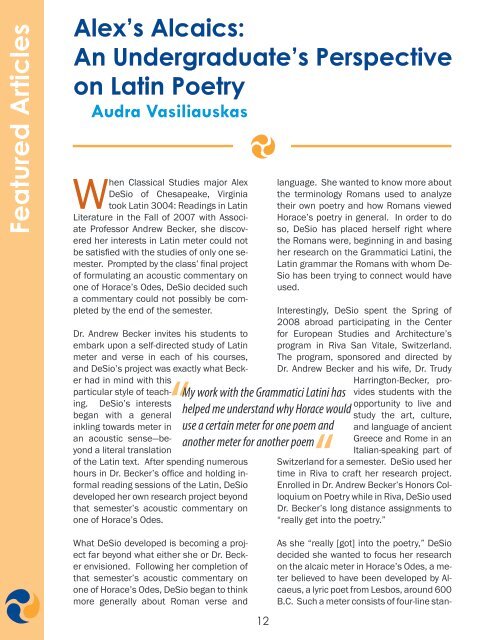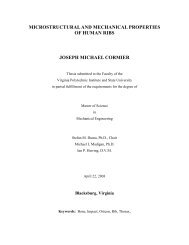Research Articles - VTechWorks - Virginia Tech
Research Articles - VTechWorks - Virginia Tech
Research Articles - VTechWorks - Virginia Tech
Create successful ePaper yourself
Turn your PDF publications into a flip-book with our unique Google optimized e-Paper software.
Featured <strong>Articles</strong><br />
Alex’s Alcaics:<br />
An Undergraduate’s Perspective<br />
on Latin Poetry<br />
Audra Vasiliauskas<br />
When Classical Studies major Alex<br />
DeSio of Chesapeake, <strong>Virginia</strong><br />
took Latin 3004: Readings in Latin<br />
Literature in the Fall of 2007 with Associate<br />
Professor Andrew Becker, she discovered<br />
her interests in Latin meter could not<br />
be satisfied with the studies of only one semester.<br />
Prompted by the class’ final project<br />
of formulating an acoustic commentary on<br />
one of Horace’s Odes, DeSio decided such<br />
a commentary could not possibly be completed<br />
by the end of the semester.<br />
Dr. Andrew Becker invites his students to<br />
embark upon a self-directed study of Latin<br />
meter and verse in each of his courses,<br />
and DeSio’s project was exactly what Becker<br />
had in mind with this<br />
particular style of teaching.<br />
DeSio’s interests<br />
began with a general<br />
inkling towards meter in<br />
an acoustic sense—beyond<br />
a literal translation<br />
of the Latin text. After spending numerous<br />
hours in Dr. Becker’s office and holding informal<br />
reading sessions of the Latin, DeSio<br />
developed her own research project beyond<br />
that semester’s acoustic commentary on<br />
one of Horace’s Odes.<br />
What DeSio developed is becoming a project<br />
far beyond what either she or Dr. Becker<br />
envisioned. Following her completion of<br />
that semester’s acoustic commentary on<br />
one of Horace’s Odes, DeSio began to think<br />
more generally about Roman verse and<br />
My work with the Grammatici Latini has<br />
helped me understand why Horace would<br />
use a certain meter for one poem and<br />
another meter for another poem<br />
12<br />
language. She wanted to know more about<br />
the terminology Romans used to analyze<br />
their own poetry and how Romans viewed<br />
Horace’s poetry in general. In order to do<br />
so, DeSio has placed herself right where<br />
the Romans were, beginning in and basing<br />
her research on the Grammatici Latini, the<br />
Latin grammar the Romans with whom De-<br />
Sio has been trying to connect would have<br />
used.<br />
Interestingly, DeSio spent the Spring of<br />
2008 abroad participating in the Center<br />
for European Studies and Architecture’s<br />
program in Riva San Vitale, Switzerland.<br />
The program, sponsored and directed by<br />
Dr. Andrew Becker and his wife, Dr. Trudy<br />
Harrington-Becker, pro-<br />
vides students with the<br />
opportunity to live and<br />
study the art, culture,<br />
and language of ancient<br />
Greece and Rome in an<br />
Italian-speaking part of<br />
Switzerland for a semester. DeSio used her<br />
time in Riva to craft her research project.<br />
Enrolled in Dr. Andrew Becker’s Honors Colloquium<br />
on Poetry while in Riva, DeSio used<br />
Dr. Becker’s long distance assignments to<br />
“really get into the poetry.”<br />
As she “really [got] into the poetry,” DeSio<br />
decided she wanted to focus her research<br />
on the alcaic meter in Horace’s Odes, a meter<br />
believed to have been developed by Alcaeus,<br />
a lyric poet from Lesbos, around 600<br />
B.C. Such a meter consists of four-line stan-



